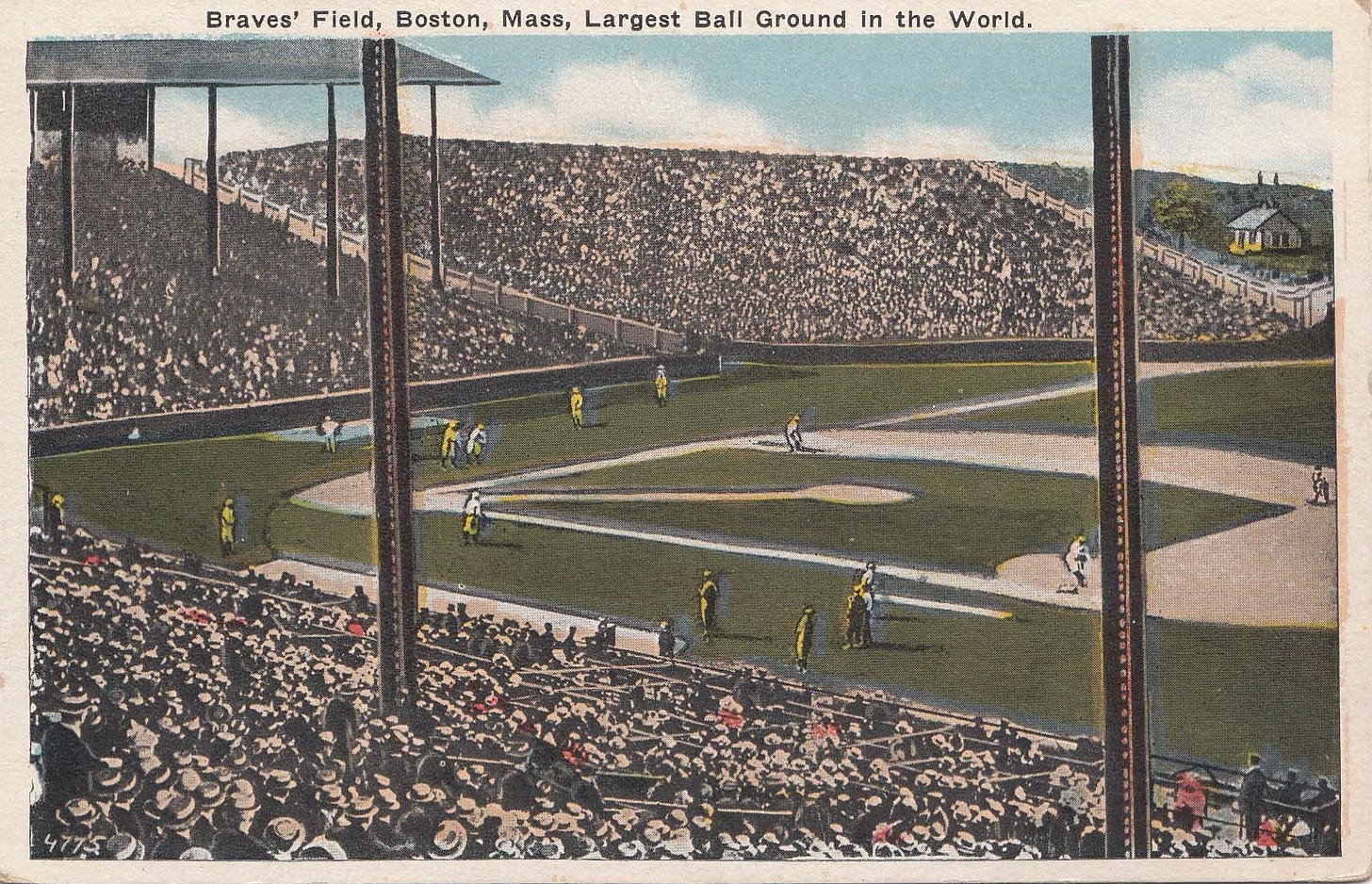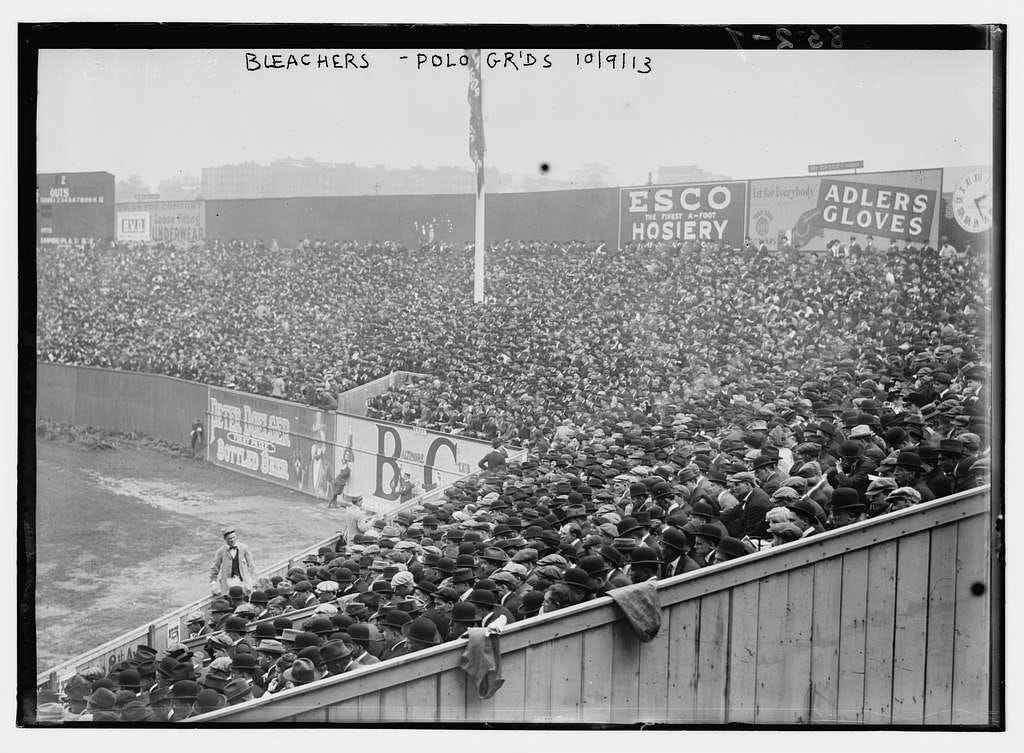Baseball, Community, and the Meaning of the Crowd
“Just as any of you is one of a living crowd, I was one of a crowd.” Walt Whitman, “Crossing Brooklyn Ferry”
Take me out to the ballgame! It’s opening day and time for baseball, the oldest and grandest of America’s team sports.
While baseball has lost much of its luster over the years as it has been largely outmaneuvered by the other professional sports leagues and abandoned by a growing segment of the American public for whom its slowness and lack of constant entertainment are a huge obstacle. It still holds its place as the quintessentially American sport with deep roots in our culture and history.
I love baseball, warts and all, because, in spite of its recent efforts to pander to the shortening attention span of the public, commodification of everything, and the Taylorized efficiency of the culture at large, it has deep slowness and a utopian embrace of the pastoral and egalitarian currents in American life that still resonate.
It is, despite its many issues, the stuff of poetry both on and off the field.
In William Carlos Williams’s fine poem “The crowd at the ball game” he notes the beauty, love, and menace of the crowd:
The crowd at the ball game
is moved uniformly
by a spirit of uselessness
which delights them —
all the exciting detail
of the chase
and the escape, the error
the flash of genius —
all to no end save beauty
the eternal -
So in detail they, the crowd,
are beautiful
for this
to be warned against
saluted and defied —
It is alive, venomous
it smiles grimly
its words cut —
The flashy female with
her mother, gets it —
The Jew gets it straight –
it is deadly, terrifying —
It is the Inquisition, the
Revolution
It is beauty itself
that lives
day by day in them
idly —
This is
the power of their faces
It is summer, it is the solstice
the crowd is
cheering, the crowd is laughing
in detail
permanently, seriously
without thought
Delighted by the useless beauty of the game, the crowd itself is part of it. It is “moved uniformly” and thus becomes “beautiful in detail” as well. Here Williams is admiring the expansive largeness of the crowd a là Walt Whitman. There is something compelling about the loss of individual self in the larger, collective self for which we yearn. We want, as Whitman puts it, to be part of the “living crowd.”
But there is also danger, that part of the crowd to be “warned against.” And it is that same loss of self that is saluted that Williams thinks we also need to defy. It is the venomous, grimly smiling crowd that leers at the flashy female and makes the Jew, the outsider, uncomfortable. You may want to be embraced by the loving crowd, but the mob might lynch you.
And then the poem returns to “the beauty that lives day by day in them” and the “power of their faces” cheering and laughing “without thought.”
So is this terribly beautiful crowd out of “Song of Myself” or Triumph of the Will or both?
When Williams wrote this poem in the 1920s, baseball was rapidly moving away from its rural, largely white, Anglo-Saxon roots, and attracting a larger, urban, fan base—working class crowds full of immigrants and more women (although the Negro Leagues were still the only place where African Americans were welcome to play). At the same time the Klan was very active, and Fascism was soon to be on the rise in Europe. Thus, the embrace of the living crowd is tempered with an awareness of the potential for the ugly lynch mob.
What we are left with then is unresolved ambivalence. The utopian and dystopian elements are both present at the ballgame. The crowd itself is “without thought” in the end. It just is.
So what does the act of watching baseball mean today? If you are with many of my friends on the left, sports consumption is little more than a way to enforce hegemony on the duped masses. By that view, a Padres game is a soft-focus version of Triumph of the Will with mandatory super-patriotism rammed down your throat every five minutes, complete with every Sunday’s camo jerseys and salute to the military industrial complex.
Hence going to the ballgame, this story goes, is a diversion at best, a kind of fascist indoctrination at worst. As Noam Chomsky puts it, “One of the functions that things like professional sports play, in our society and others, is to offer an area to deflect people's attention from things that matter, so that the people in power can do what matters without public interference.”
A useful way of addressing the meaning of fan communities comes in Dean Chadwin’s Those Damn Yankees: The Secret Life of America’s Greatest Franchise. While his book is mostly devoted to exploding the Yankee myth and exploring its sordid corporate underbelly, Chadwin does spend some time discussing the meaning of fandom. Specifically, he notes that, “The identification with a team, its uniform, and history involves baseball’s most direct appeal to the gut. The tribalism displayed by a community of fans has an almost immeasurable force. It creates instant civic rivalries where none previously existed.”
In the course of his skewering of the Yankees, Chadwin describes their fans as a “hegemonic nation interested only in the claims of monarchy, a tribe set on domination . . . They are the worst New York has to offer: loud, aggressive, unruly, unthinking, cocky, self- absorbed, dictatorial, ungenerous celebrants of triumphalism.”
Of more interest than the condemnation here is Chadwin’s use of the metaphor of the nation. “Yankee nation,” as Chadwin calls the fans of the Bronx bombers, is more than just a disparate collection of individuals watching a baseball game; it is a group identity, a site of shared meaning:
Although the crowd in the bleachers will return home to their separate lives as soon as the game ends, for a few hours they inhabit a place where only one identity is acceptable: Yankee fan. Here Benedict Anderson’s imagined community is very real indeed. Any statement that violates the group’s one idea can prove dangerous. Fans wearing hats in support of the rival Mets or Red Sox are hounded by hundreds of fans pointing and chanting “Mets Suck” or “Boston Sucks.”
Chadwin invokes the notion of an imagined community here as a way of understanding fan identity, but his discussion of fans is limited to their competitive tribalism.
The term “imagined community” comes not from a cultural analysis of sports, but, as Chadwin notes, from Benedict Anderson’s book on nationalism entitled Imagined Communities. Anderson sets out to analyze why people love, die, and kill for nations. Central to his project is an exploration of the roots of people’s sense of belonging to an “empty” philosophical concept.
But this phenomenon is not limited to political communities. In fact, Anderson tells us, “all communities larger than the primordial villages of face-to-face contact (and perhaps even these) are imagined. Communities are to be distinguished, not by their falsity/genuineness, but by the style in which they are imagined.”
The fictional nature of the nation is what allows it to supersede fundamental differences and conflicts of interest amongst its members. As Anderson puts it, “It is imagined as a community, because, regardless of the actual inequality and exploitation that may prevail in each, the nation is always conceived as a deep horizontal comradeship.”
Hence, beneath all the commercialism and competitive rivalry is a deeper yearning for community that we dismiss at our peril. For if all crowds are reduced to “mobs” or “the duped masses” there’s ultimately not much hope for democracy in the end. And the more we replace the messy experience of the face-to-face social encounter with our fixed and mobile screens, the further we move beyond old fashioned alienation toward an ever-more-affectless society, one solely centered on the atomized isolated individual.
To yearn for the crowd is to yearn for belonging in community--to dream of some kind of connectedness with your fellow humans. People look to sports for a sense of something larger because, as Robert Putnam noted in Bowling Alone, social capital has severely eroded throughout our society.
So, people look for some kind of connectedness. And there’s something to be said for that. As we head into an electoral season where much of the country will be flirting with fascism, perhaps it is a mistake to give up on the messy, contradictory crowd with all its love, hatred, and chaotic excess. Spending too much time alone together on cellphones, social media, and Zoom screens hasn’t worked out that well for us either, to put it mildly.
So, I’ll see you at the ballgame, for better or worse. If I kick over your beer by accident, I’ll buy you a new one. Win or lose, I’ll put place my bet on the better angels of our nature.
Play ball!








